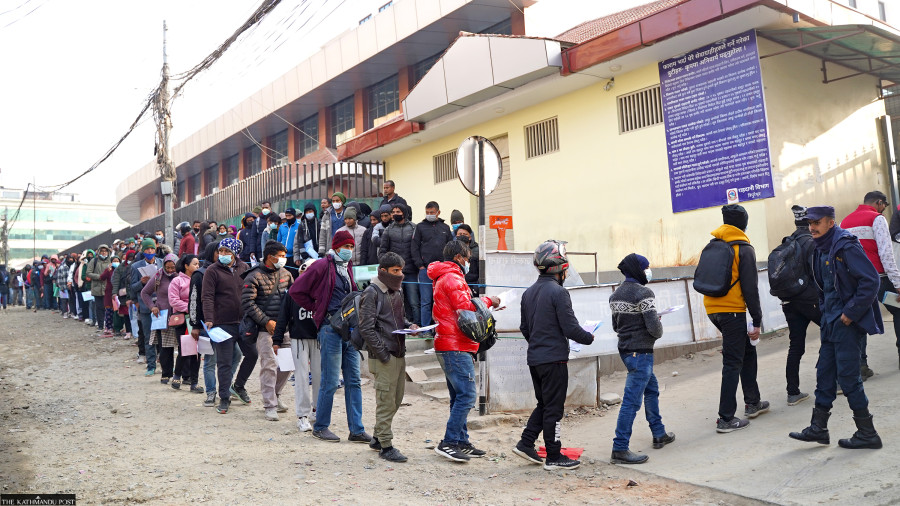National
Experts suggest executive take bureaucracy into confidence to improve services
Prime Minister Dahal this week upbraided bureaucrats for their tardiness in providing services to the public, and threatened action.
Purushottam Poudel
Pushpa Kamal Dahal, the chairman of the CPN (Maoist Centre), who has only recently been appointed to helm the government, is often accused of busying himself with power games.
This time, however, within days of being appointed as prime minister, Dahal issued a series of orders to the bureaucracy and all of them were related to the government’s service delivery and directly related to the general public’s day-to-day problems. The prime minister has issued circulars to government agencies such as the passport and transport departments, where hundreds of people queue up to get basic services, to immediately improve service delivery so that people aren’t compelled to stand for hours to receive documents such as passports, driving licences and citizenship and national identity cards.
The Office of the Prime Minister and the Council of Ministers, on Monday, invited secretaries of the government ministries to take stock of the projects under their respective ministries.
After listening to the top bureaucrats, Prime Minister Dahal, on Tuesday, issued a stern 30-point directive to the top bureaucrats to work efficiently to deliver government services to the public, or face action.
The series of actions by the newly-appointed prime minister has sparked a debate over the prime minister’s working style. Some have applauded Dahal for springing into action, while others say such prompt actions without legal grounds may not be as productive.
Former chief of the Public Service Commission Umesh Mainali finds it appropriate for the head of government to seek information on the activities of ministries. He, however, said that it was unbecoming for a three-time prime minister to warn top bureaucrats in such a fashion.
“It sounded like bureaucratic bashing,” Mainali told the Post. “Prime Minister Dahal knows the complexity of our bureaucracy and he also needs to address those issues before warning the bureaucrats to work efficiently.”
Prime Minister Dahal directed the authorities concerned to allow Nepali citizens to bring more than one mobile phone set from abroad without paying taxes. Earlier the Finance Ministry had decided to levy an 18 percent customs duty if a Nepali returning from abroad was found to have brought along more than one handheld device. The ministry’s decision faced strong criticism on social media and other public platforms. Nepali migrant workers abroad even launched a ‘no remittance’ campaign on social media, stating they would stop sending remittances to Nepal.
“Although the prime minister immediately issued an instruction to civil servants to waive the tax , the related law has not been amended leading to a complexity,” Mainali said. “Therefore, before issuing directives, the prime minister should make related legal arrangements and ensure necessary resources.”
The former government secretary, Mainali, said that no government can function well without taking the bureaucracy into confidence.
Political leaders often accuse the bureaucracy of not cooperating with new ministers.
Some experts, however, said that the situation should be looked at from a different perspective as well.
They said the tendency of transferring or promoting civil servants based on their political affiliations after every change in government leads to insecurity among civil servants and makes them seek political patronage.
“Whenever a new political party comes to power, it rewards people closer to the party with promotions and lucrative transfers, and this kind of tendency causes alienates others and gives rise to a deficit of trust between the government and the bureaucracy,” the former chief secretary of the Nepal government, Bimal Koirala, told the Post.
The cabinet meeting held on Thursday transferred a few secretaries.
Unless there is a mechanism in place to monitor the work of the various ministries, the directives of the prime minister won’t yield any results, said the former top bureaucrat.
Kashiraj Dahal, former head of the High-level Administration Reform and Monitoring Committee, however, has a different opinion. He said that there are problems in the bureaucracy also and they need to be fixed.
“Our bureaucracy is oblivious to the needs of the people and is self-serving. That is the reason why every government leadership instructs them to work on behalf of the public,'' said Dahal.
He said the bureaucracy is beset with three major problems.
“The first is management, the second is service delivery, and the third is the behaviour of the civil servants/bureaucrats,” Dahal said. “Therefore, such instructions should be given from time to time.”
The Maoist Centre’s deputy general secretary Pampha Bhusal, who was a minister until recently, said that the prime minister issued the directives with a good intention to make service delivery more effective. “Prime Minister’s direction to the top bureaucrats does not mean our bureaucracy is ineffective, the new leadership of the government often shares its vision with the top government officers and it is the continuation of the same,” Bhusal told the Post.
In a 30-point directive issued Tuesday, Prime Minister Dahal instructed government secretaries to keep an eye on the rising road accidents and expedite prosecutions against the accused. Dahal also ordered a crackdown on transport cartels and effective implementation of anti-corruption measures.




 18.12°C Kathmandu
18.12°C Kathmandu














